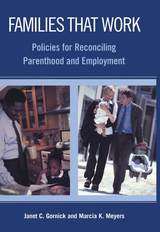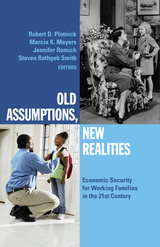2 books about Meyers, Marcia K.

Families That Work
Policies for Reconciling Parenthood and Employment
Janet C. Gornick
Russell Sage Foundation, 2003
Parents around the world grapple with the common challenge of balancing work and child care. Despite common problems, the industrialized nations have developed dramatically different social and labor market policies—policies that vary widely in the level of support they provide for parents and the extent to which they encourage an equal division of labor between parents as they balance work and care. In Families That Work, Janet Gornick and Marcia Meyers take a close look at the work-family policies in the United States and abroad and call for a new and expanded role for the U.S. government in order to bring this country up to the standards taken for granted in many other Western nations. In many countries in Europe and in Canada, family leave policies grant parents paid time off to care for their young children, and labor market regulations go a long way toward ensuring that work does not overwhelm family obligations. In addition, early childhood education and care programs guarantee access to high-quality care for their children. In most of these countries, policies encourage gender equality by strengthening mothers' ties to employment and encouraging fathers to spend more time caregiving at home. In sharp contrast, Gornick and Meyers show how in the United States—an economy with high labor force participation among both fathers and mothers—parents are left to craft private solutions to the society-wide dilemma of "who will care for the children?" Parents—overwhelmingly mothers—must loosen their ties to the workplace to care for their children; workers are forced to negotiate with their employers, often unsuccessfully, for family leave and reduced work schedules; and parents must purchase care of dubious quality, at high prices, from consumer markets. By leaving child care solutions up to hard-pressed working parents, these private solutions exact a high price in terms of gender inequality in the workplace and at home, family stress and economic insecurity, and—not least—child well-being. Gornick and Meyers show that it is possible–based on the experiences of other countries—to enhance child well-being and to increase gender equality by promoting more extensive and egalitarian family leave, work-time, and child care policies. Families That Work demonstrates convincingly that the United States has much to learn from policies in Europe and in Canada, and that the often-repeated claim that the United States is simply "too different" to draw lessons from other countries is based largely on misperceptions about policies in other countries and about the possibility of policy expansion in the United States.
[more]

Old Assumptions, New Realities
Ensuring Economic Security for Working Families in the 21st Century
Robert D. Plotnick
Russell Sage Foundation, 2011
The way Americans live and work has changed significantly since the creation of the Social Security Administration in 1935, but U.S. social welfare policy has failed to keep up with these changes. The model of the male breadwinner-led nuclear family has given way to diverse and often complex family structures, more women in the workplace, and nontraditional job arrangements. Old Assumptions, New Realities identifies the tensions between twentieth-century social policy and twenty-first-century realities for working Americans and offers promising new reforms for ensuring social and economic security. Old Assumptions, New Realities focuses on policy solutions for today's workers—particularly low-skilled workers and low-income families. Contributor Jacob Hacker makes strong and timely arguments for universal health insurance and universal 401(k) retirement accounts. Michael Stoll argues that job training and workforce development programs can mitigate the effects of declining wages caused by deindustrialization, technological changes, racial discrimination, and other forms of job displacement. Michael Sherraden maintains that wealth-building accounts for children—similar to state college savings plans—and universal and progressive savings accounts for workers can be invaluable strategies for all workers, including the poorest. Jody Heymann and Alison Earle underscore the potential for more extensive work-family policies to help the United States remain competitive in a globalized economy. Finally, Jodi Sandfort suggests that the United States can restructure the existing safety net via state-level reforms but only with a host of coordinated efforts, including better information to service providers, budget analyses, new funding sources, and oversight by intermediary service professionals. Old Assumptions, New Realities picks up where current policies leave off by examining what's not working, why, and how the safety net can be redesigned to work better. The book brings much-needed clarity to the process of creating viable policy solutions that benefit all working Americans. A West Coast Poverty Center Volume
[more]
READERS
Browse our collection.
PUBLISHERS
See BiblioVault's publisher services.
STUDENT SERVICES
Files for college accessibility offices.
UChicago Accessibility Resources
home | accessibility | search | about | contact us
BiblioVault ® 2001 - 2024
The University of Chicago Press









